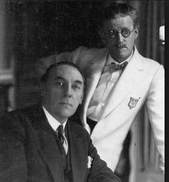 James Joyce and John O'Sullivan
James Joyce and John O'Sullivan Turnstile One, a “Literary Miscellany from The New Statesman and Nation” of the 1930's and early 1940's - no more carping. There are some interesting curiosities and some great things, as well.
Among the curiosities:
§ “From a Banned Writer to a Banned Singer” by James Joyce. (1932)
A series of Joycean word contraptions, à la Finnegan, each a mad-cap summary of a particular opera as performed by Joyce’s friend, the tenor, John O’Sullivan.
Is this our model vicar of Saint Wartburgh's, the reverend Mr Townhouser, Mus. Bac., discovered flagrant in a montagne de passed. She is obvious and is on her threelegged sofa in a half yard of casheselks, Madame de la Pierreuse. How duetonically she hands him his harp that once, bitting him, whom caught is willing: do blease to, fickar! She's as only roman as any puttana maddonna but the trouble is that the reverend T is reformed.
These operatic in-jokes originally were included in a letter from Joyce to “Sullivan” (for some reason Joyce drops the “O’”).
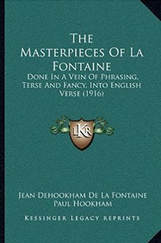 Paul Hookham. (No portrait anywhere I looked) Scholar, translator (“The Masterpieces of La Fontaine Done in a Vein of Phrasing, Terse and Fancy, into English Verse”) and avowed skeptic who, caught up in the spiritualist controversy, chose to consider that séances were genuine phenomena, and that the trances of mediums, instead of being conduits to the dead, are conduits into the minds of the living, that “all that comes from a medium’s lips may be derived by her from some record existing either in the memories of living men or in books or material objects, and consequently no information imparted through a medium can ever be proved beyond doubt to emanate from any intelligence external to this world.”
Paul Hookham. (No portrait anywhere I looked) Scholar, translator (“The Masterpieces of La Fontaine Done in a Vein of Phrasing, Terse and Fancy, into English Verse”) and avowed skeptic who, caught up in the spiritualist controversy, chose to consider that séances were genuine phenomena, and that the trances of mediums, instead of being conduits to the dead, are conduits into the minds of the living, that “all that comes from a medium’s lips may be derived by her from some record existing either in the memories of living men or in books or material objects, and consequently no information imparted through a medium can ever be proved beyond doubt to emanate from any intelligence external to this world.” § “Milton’s Blindness” a letter to the editor of The New Statesman from Paul Hookham, Oxford. (1930)
A great example of literary criticism from the close reading school.
Hookham posits that Milton was not totally blind, but suffered from a cataract – known to 17th century physicians, Hookham informs us, as “a gutta serena”
Hookham offers three quotations from Milton which convincingly support his idea. One of them is from Milton’s “Light”:
thee I revisit safe,
And feel thy sovran vital Lamp; but thou
Revisit'st not these eyes, that rowle in vain
To find thy piercing ray, and find no dawn;
So thick a drop serene hath quencht thir Orbs,
Or dim suffusion veild.
The italics are Hookham’s.
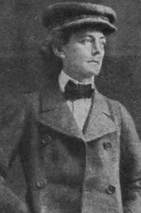 Ethyl Smyth
Ethyl Smyth § “The Waterfall” by Ethel Smythe. (1932)
Smythe was a composer. Her The Wreckers was revived in this century by Leon Botstein. I saw it performed a few years ago – a bit Wagnerian, a bit Straussian, a bit Debussyesque; not bad at all.
“The Waterfall” is, though – i. e. bad. A rambling, impressionistic memoir of girlhood.
The dénouement comes when little Ethel, dressed as a Fenimore Cooper wilderness scout, unaware of the differences in male and female anatomies and believing that simply wearing male clothing confers on one the convenience of peeing while standing up, drenches herself in urine.
The euphemisms and circumlocutions which Smythe has to resort to
(all too soon came the moment when nice-minded little girls explain they have left their pocket-handkerchief up at the house and will be back directly) are more than made up for by her modernity in telling a story whose subject matter was way beyond the polite pale, which was in fact in dirty joke territory.
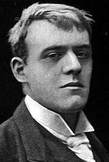 Hillaire Belloc
Hillaire Belloc ~
Needless to say, considering its impressive roster of authors, there are some wonderful pieces in Turnstile One.
§ “On I Know Not What” by Hillaire Belloc. (1920)
A scintillating experiment in the personal essay – in the spirit of Charles Lamb, with the stylistic high jinks of Tristram Shandy. This could have been really awful, but it’s not. It’s super.
I have by this time, you will observe, wandered somewhat from my subject. But then, what was my subject? If you know you are wiser than I ! What I had intended it to be I know well enough. What I had intended it to be I know well enough. I had intended it to be a disquisition upon the strange love of posthumous fame which is to be found in all the human race, and particularly in the miserable breed of writers. But really the subject has been done to death. I have myself written upon it recently in at least five places, and for all I know in these very pages. And when you come to think of it there is nothing new to be said about it.
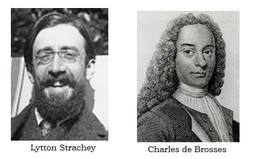
§ “The Président de Brosses” by Lytton Strachey. (1931)
Charles de Brosses was the author of Du culte des dieux fétiches ou Parallèle de l'ancienne religion de l'Egypte avec la religion actuelle de Nigritie (1760). According to Wikipedia, the book presented “a materialistic theory of the origin of religion, and represents one of the first theoretical works in the discipline of ethno-anthropology. Notably it contains the first historical occurrence of the word ‘fétichisme,’ later borrowed by Karl Marx in 1842 and used in his Capital (1867).”
Sounds like an important Enlightenment thinker, yes? Then why haven’t we (i. e., I) ever heard of him?
The reason, according to Strachey, is that he was condemned to semi-oblivion by Voltaire.
Why?
In 1760 Voltaire, ensconced at Ferney, purchased from de Brosses the life tenancy of a neighboring property, Tournay (along with the title, Comte de Tournay). In 1761 Voltaire refused to pay a bill for 281 francs presented by a Tournay peasant, Charlot Baudy, for firewood delivered before Voltaire’s purchase of Tournay. This led to an increasingly heated correspondence between Voltaire and de Brosses, with Voltaire persisting in his refusal to pay for firewood. At last, de Brosses sued Voltaire on Baudy’s behalf. When Voltaire realized he would lose the case, he agreed to a settlement, suggested by de Brosses, by which Voltaire would donate 281 francs towards the support of the poor of Tournay.
It was this rankling humiliation, says Strachey, that drove Voltaire to wage his relentless anti-de Brosses campaign. With his famous venomous wit, Voltaire belittled de Brosses’ books to his numerous celebrated friends and correspondents and, when de Brosses became the obvious candidate for a vacant seat in the French Academy, had him blackballed.
The President's moment had come — the testing moment of his life. What was he to do? It was still not too late to withdraw, to pay the money [to the peasant] with a shrug of the shoulders and put an end to this fearful hubbub and this terrifying enmity. For a short space he wavered. It was true that Voltaire was the greatest writer of the age, and perhaps he deserved some allowances on that score. In any case, he was an extremely dangerous antagonist — a man who had made mincemeat of all his literary opponents and fought on equal terms with Frederick the Great. But no! It was intolerable! His Burgundian blood boiled, and the proud traditions of aristocracy and the judicial habits of a lifetime asserted themselves. "Là-dessus on dit" — so he explained later to a friend — "c'est un homme dangereux. Et à cause de cela, faut-il donc le laisser être méchant impunément?” [On this point, everyone agrees: he is a dangerous man. Because of that, should one allow him to be nasty with impunity?]
No Marxism for Lytton Strachey, thank you. The very fact that Marxism was fashionable would have been enough to damn it for Strachey. Tournay’s (and Strachey’s) poor are not the exploited poor, yearning to break free, but the poor who will ever be with us.
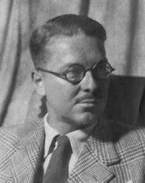
§ “Ever Such a Nice Boy” by William Plomer. (1937)
Charming. A four-page story that reminds me of the low-key vernacular humor that was being written in America at the same time by Ring Lardner, Robert Bentley, et. al. It opens:
You want to know how I first met Freddy? Oh, it’s quite a long story. No, we don’t come from the same place at all. You see, my home’s near Gloucester. I was in service there with Major and Mrs. Trumbull-Dykes. Mrs. Dykes was ever such a nice lady, she was just like a mother to me and writes to me every Christmas, not that I haven’t got a real mother, because of course I have, and she’s always been good to me too, I couldn’t wish for a better.
Not a whiff of Marxism. Everyone is quite content, even pleased, with their particular social class. The interactions between one class and another are congenial; between employed and employers they are collegial.
If Plomer had written this story today, he would be seen to be taking a stand on the question: Me Too – feminist uprising or millennial whining? However, no social consciousness niggled at him when this tripped off his pen:
Mind you, the Major was always a worry to her, you never knew what he’d be getting up to. I don’t believe there was nothing between them and hadn’t been for a long time, though I dare say the Major wished there was, so of course they always had separate bedrooms. Well, one afternoon about tea-time, yes, it must have been about tea-time because I was making the toast, the Major must always have his hot buttered toast for tea, there I was making the
toast and the Major come into the kitchen. Of course, I didn’t take no notice until he come up and caught hold of me. I asked him to let go and stop his games, but he wouldn’t, so I hit at his hands with the toasting-fork to
make him leave go of me. He had ever such big veins in his hands, they stood right out. “Oh, you little vixen! You little spitfire!” he said. “Well, you had no call to lay hands on me,” I said, “whatever would Mrs. Dykes say?” And as he wouldn’t stop his tricks I said ‘Give over, will you!” and hit him again over the knuckles with the toasting-fork. “Damn it, damn it,” he said, and then he run out.
Just as I was getting tea ready to take into the drawing-room Mrs. Dykes come in, she’d been out shopping, and “Oh, Edith,” she said, “I’ll just take the Major’s tea up to him. He’s ever so upset,” she said, “he’s hurt his hands something dreadful, he’s resting in his room. He caught them in the mowing machine and they’re all swollen up.” Of course I didn’t say anything, but you should have seen the state his hands were in. Of course, I didn’t mean to hurt him like that, but it was his own fault in a way, wasn’t it?
§ “Letter from Germany” by D. H. Lawrence. (1934)
These are not the Germans we once knew.
Perspicacious, considering when it was written.
§ “Gas at Abbotsford” by Virginia Woolf. (1940)
An amusing and cleverly written (it’s Virginia Woolf, so of course!) depiction of the domestic life of Sir Walter Scott, drawn mainly from the diaries of a painter, William Berwick, in residence to paint Scott’s portrait.
~
If you wish to amaze your friends and be the envy of your neighbors, Turnstile One is available from ABE Books for under ten dollars.
 RSS Feed
RSS Feed